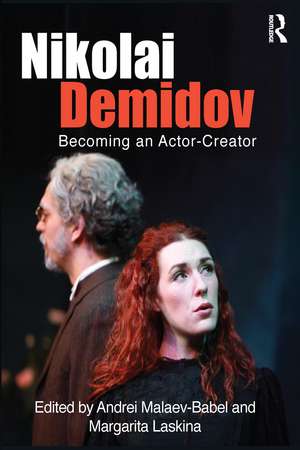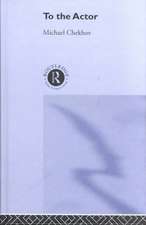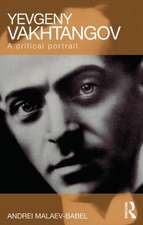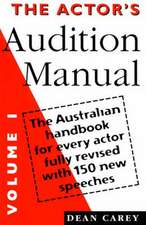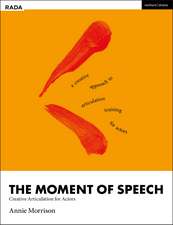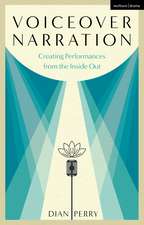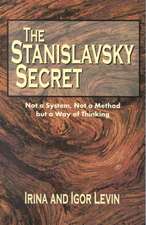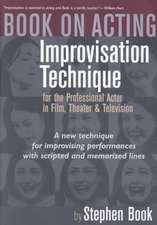Nikolai Demidov: Becoming an Actor-Creator
Autor Nikolai Demidov Editat de Andrei Malaev-Babel, Margarita Laskinaen Limba Engleză Hardback – 7 iul 2016
Despite being one of the original teachers of the Stanislavski system, Demidov’s name was little known either in his native Russia or the wider world until the turn of the 21st Century. Since then, his extensive works have been published in Russian but are yet to find their way to the English-speaking world. His sophisticated psychological techniques, stimulation of creativity, and methods of developing the actors themselves are now gaining increasing recognition.This book brings together Demidov’s five volumes on actor training. Supplementary materials, including transcriptions of Demidov’s classes, and notes and correspondence from the author make this the definitive collection on one of Russian theatre’s most important figures.
| Toate formatele și edițiile | Preț | Express |
|---|---|---|
| Paperback (1) | 343.55 lei 3-5 săpt. | +57.38 lei 7-11 zile |
| Taylor & Francis – 18 dec 2020 | 343.55 lei 3-5 săpt. | +57.38 lei 7-11 zile |
| Hardback (1) | 1203.09 lei 6-8 săpt. | |
| Taylor & Francis – 7 iul 2016 | 1203.09 lei 6-8 săpt. |
Preț: 1203.09 lei
Preț vechi: 1605.17 lei
-25% Nou
Puncte Express: 1805
Preț estimativ în valută:
230.20€ • 240.38$ • 190.10£
230.20€ • 240.38$ • 190.10£
Carte tipărită la comandă
Livrare economică 15-29 aprilie
Preluare comenzi: 021 569.72.76
Specificații
ISBN-13: 9781138776494
ISBN-10: 1138776491
Pagini: 830
Ilustrații: 20
Dimensiuni: 174 x 246 x 48 mm
Greutate: 1.64 kg
Ediția:1
Editura: Taylor & Francis
Colecția Routledge
Locul publicării:Oxford, United Kingdom
ISBN-10: 1138776491
Pagini: 830
Ilustrații: 20
Dimensiuni: 174 x 246 x 48 mm
Greutate: 1.64 kg
Ediția:1
Editura: Taylor & Francis
Colecția Routledge
Locul publicării:Oxford, United Kingdom
Public țintă
Academic, General, Postgraduate, and UndergraduateCuprins
NIKOLAI DEMIDOV – A CREATIVE BIOGRAPHY (From the Editors)
BOOK ONE: THE ART OF THE ACTOR - ITS PRESENT AND FUTURE
Introduction
1. Reasons For The Fall Of The Art Of The Actor
2. Truth
3. Truth, As It Is Normally Understood (Pseudoexperiencing)
4. The Intangibility Of Truth
5. On Artistry And The Artist
6. The Artist - His Chief Qualities
7. The Path Of The Artist
8. The Path To Becoming An Artist
BOOK TWO: ACTOR TYPES
Actor Types
The Imitator
The Emotional Actor
The Affective Actor
Rationality And The Stage
Emotional Attributes: Their "Structure" And Development. Perception and Reaction.
Emotionality And Its Various Forms
Rationality (Reasoning) - A Lack Of Emotional Development
Process And Result
How Depictors Are Made (A Necessary Elaboration)
Those Who Depict And Those Who Live
Distinct Qualities Of The Four Actor Types
The Imitator
The Emotional Actor
The Affective Actor
The Rationalist
"Ailments" And Weaknesses (Shortcomings) Of The Four Actor Types
The Imitator
The Emotional Actor
The Affective Actor
The Rationalist
Complex Types
The "Types" In Directing
"Types" Of Theatres
Rationality And Imperativity In The Actor’s Technique
Will And Imperativity
BOOK THREE: THE ART OF LIVING ONSTAGE
Preliminary Notes (From The Author)
Part One: The Significance Of The Actor’s Creative Experiencing.
Paths Leading Toward It
1. Initial Steps Toward Mastering The Art Of The Actor’s Experiencing
2. New Paths
3. On Freedom And Involuntariness In The Process Of Creative Experiencing
Part Two: The Path Of Spontaneous Reaction
1. Mistakes Of The Past And Glimpses Of The New
2. Freedom And Involuntariness
3. Actor’s Fantasy
4. Student’s First Steps "Onstage"
5. Some Thoughts On The Pedagogy
6. Weakness Of The Actors’ Creative Ties
7. On The Beginning
8. On The Theatrical And Non-Theatrical
9. On The Text
10. Incoherence
11. What Do We Gain From These Etudes?
Part Three: Some Basic Principles And Techniques
1. The Threshold Of Creative Experiencing
2. Solidifying An Actor In The Creative State ("Support")
3. The Role Of Automatic Movements In The Cultivating Freedom And Spontaneity
4. Don’t Interfere With Living
5. Carelessness
6. Take Your Time!
7. Play-Acting
8. Perception
9. Free Reaction ("Green-Lighting")
10. Braking
11. Stepping On It
12. Physiology
13. Assignment
Part Four: Guiding Freedom And Involuntariness
1. Circumstances
2. Forgetting
3. Concreteness As A Path To Authentic Perception
4. The Ambiguities Of The Given Circumstances As A Motivating, Driving Force In The Actor’s Art
5. The Character
6. Types Of Characters
7. The Appearance, Strengthening And Development Of A Character
Part Five: Conclusion
1. Practical Advice For Teachers
2. On The Way Forward
Additional Materials
Various Notes
Fantasy And Imagination
Additions To The Chapter On Circumstances
Crude Reactions
On Work At Home
On Evaluated Showings and Other Topics
The Necessity Of An "Etude Technique" For The Actor’s Stage Work
Can You And Should You Combine The "Stanislavsky System" With My Principles And Methods?
The Ideal
BOOK FOUR: THE ARTIST’S CREATIVE PROCESS ONSTAGE
Introduction
1. On The Difference Of Acting Techniques
2. Calling And Abilities
3. The Actor And Life
4. The Actor And The Author
5. The Actor And The Director
6. The Actor And Form
7. A Few Critical Thoughts On Some Methods And Terms Of Ruling Theatre Schools
8. The Embryo
9. Synthesis And Grasp
10. Character. Transformation
11. Transformation
12. On Several Principles Of The Psycho-Technique
13. On The Few Principles Of Theatre Pedagogy
14. On Preparing Yourself For Rehearsals And Performance
15. Repetition
Addendum
Energy
The Future Book On The Actor’s "Ailments" And Errors – Those Provoked By The Audience, Bad Schooling, Or Poor Examples (Outline)
BOOK FIVE: PSYCHO-TECHNIQUE OF THE AFFECTIVE ACTOR
1. Creativity
2. Emotionally-Synthesizing Thinking
3. Primitive Sensations And Biologism
4. Doubled Consciousness
5. Unity
6. The Subconscious Nature Of Creativity
7. Automatisms
8. Will
9. "Activity" Or "Passivity"?
10. Culture Of "Calm"
11. The Threshold And After-The-Threshold
12. On Breathing
13. The Actor And The Audience
14. Advice For Future Researchers Of The Actor’s Creative Technique
Conclusion
BOOK ONE: THE ART OF THE ACTOR - ITS PRESENT AND FUTURE
Introduction
1. Reasons For The Fall Of The Art Of The Actor
2. Truth
3. Truth, As It Is Normally Understood (Pseudoexperiencing)
4. The Intangibility Of Truth
5. On Artistry And The Artist
6. The Artist - His Chief Qualities
7. The Path Of The Artist
8. The Path To Becoming An Artist
BOOK TWO: ACTOR TYPES
Actor Types
The Imitator
The Emotional Actor
The Affective Actor
Rationality And The Stage
Emotional Attributes: Their "Structure" And Development. Perception and Reaction.
Emotionality And Its Various Forms
Rationality (Reasoning) - A Lack Of Emotional Development
Process And Result
How Depictors Are Made (A Necessary Elaboration)
Those Who Depict And Those Who Live
Distinct Qualities Of The Four Actor Types
The Imitator
The Emotional Actor
The Affective Actor
The Rationalist
"Ailments" And Weaknesses (Shortcomings) Of The Four Actor Types
The Imitator
The Emotional Actor
The Affective Actor
The Rationalist
Complex Types
The "Types" In Directing
"Types" Of Theatres
Rationality And Imperativity In The Actor’s Technique
Will And Imperativity
BOOK THREE: THE ART OF LIVING ONSTAGE
Preliminary Notes (From The Author)
Part One: The Significance Of The Actor’s Creative Experiencing.
Paths Leading Toward It
1. Initial Steps Toward Mastering The Art Of The Actor’s Experiencing
2. New Paths
3. On Freedom And Involuntariness In The Process Of Creative Experiencing
Part Two: The Path Of Spontaneous Reaction
1. Mistakes Of The Past And Glimpses Of The New
2. Freedom And Involuntariness
3. Actor’s Fantasy
4. Student’s First Steps "Onstage"
5. Some Thoughts On The Pedagogy
6. Weakness Of The Actors’ Creative Ties
7. On The Beginning
8. On The Theatrical And Non-Theatrical
9. On The Text
10. Incoherence
11. What Do We Gain From These Etudes?
Part Three: Some Basic Principles And Techniques
1. The Threshold Of Creative Experiencing
2. Solidifying An Actor In The Creative State ("Support")
3. The Role Of Automatic Movements In The Cultivating Freedom And Spontaneity
4. Don’t Interfere With Living
5. Carelessness
6. Take Your Time!
7. Play-Acting
8. Perception
9. Free Reaction ("Green-Lighting")
10. Braking
11. Stepping On It
12. Physiology
13. Assignment
Part Four: Guiding Freedom And Involuntariness
1. Circumstances
2. Forgetting
3. Concreteness As A Path To Authentic Perception
4. The Ambiguities Of The Given Circumstances As A Motivating, Driving Force In The Actor’s Art
5. The Character
6. Types Of Characters
7. The Appearance, Strengthening And Development Of A Character
Part Five: Conclusion
1. Practical Advice For Teachers
2. On The Way Forward
Additional Materials
Various Notes
Fantasy And Imagination
Additions To The Chapter On Circumstances
Crude Reactions
On Work At Home
On Evaluated Showings and Other Topics
The Necessity Of An "Etude Technique" For The Actor’s Stage Work
Can You And Should You Combine The "Stanislavsky System" With My Principles And Methods?
The Ideal
BOOK FOUR: THE ARTIST’S CREATIVE PROCESS ONSTAGE
Introduction
1. On The Difference Of Acting Techniques
2. Calling And Abilities
3. The Actor And Life
4. The Actor And The Author
5. The Actor And The Director
6. The Actor And Form
7. A Few Critical Thoughts On Some Methods And Terms Of Ruling Theatre Schools
8. The Embryo
9. Synthesis And Grasp
10. Character. Transformation
11. Transformation
12. On Several Principles Of The Psycho-Technique
13. On The Few Principles Of Theatre Pedagogy
14. On Preparing Yourself For Rehearsals And Performance
15. Repetition
Addendum
Energy
The Future Book On The Actor’s "Ailments" And Errors – Those Provoked By The Audience, Bad Schooling, Or Poor Examples (Outline)
BOOK FIVE: PSYCHO-TECHNIQUE OF THE AFFECTIVE ACTOR
1. Creativity
2. Emotionally-Synthesizing Thinking
3. Primitive Sensations And Biologism
4. Doubled Consciousness
5. Unity
6. The Subconscious Nature Of Creativity
7. Automatisms
8. Will
9. "Activity" Or "Passivity"?
10. Culture Of "Calm"
11. The Threshold And After-The-Threshold
12. On Breathing
13. The Actor And The Audience
14. Advice For Future Researchers Of The Actor’s Creative Technique
Conclusion
Notă biografică
Nikolai Demidov (1884-1953) began his career as a practising psychiatrist and athletic trainer, before becoming assistant to Konstantin Stanislavski at the Moscow Art Theatre. He went on to be co-founder of the Moscow Art Theatre School, and one of the original teachers of Stanislavski's system. Following his mentor's death, Demidov's radical, innovative approaches saw him ostracised from Moscow and his role in Russian actor training largely wiped from the history books. The efforts of his celebrated pupils - including Maria Knebel, Boris Livanov and Margarita Laskina - have seen his work gradually return to recognition following the demise of the Soviet Union.
Andrei Malaev-Babel is an actor, director and scholar, a graduate of the Vakhtangov Theatre Institute in Moscow. He serves as an Associate Professor of Theatre at the FSU/Asolo Conservatory for Actor Training, and on the board of the Michael Chekhov Association. He is the editor of The Vakhtangov Sourcebook and author of Yevgeny Vakhtangov: A critical portrait.
Andrei Malaev-Babel is an actor, director and scholar, a graduate of the Vakhtangov Theatre Institute in Moscow. He serves as an Associate Professor of Theatre at the FSU/Asolo Conservatory for Actor Training, and on the board of the Michael Chekhov Association. He is the editor of The Vakhtangov Sourcebook and author of Yevgeny Vakhtangov: A critical portrait.
Recenzii
"Deserves to become the backbone of every actor’s library."
- Stanislavsky Studies
"Andrei Malaev-Babel and Margarita Laskina have taken on the formidable but necessary task of introducing Nikolai Demidov to the English-speaking world; and it is a major achievement. These pages are fresh, conversational, and, at times, provocatively categorical. Stimulating reading, they are illuminated by Malaev-Babel’s impeccable research."
- Professor Maria Shevtsova, Goldsmith, University of London
"Long repressed, Demidov’s radical ideas about acting are now being re-discovered and implemented in Russia. Now, through this extraordinary volume, we who read English over Russian can begin the exploration of these critical insights and lessons, and add a new name to the roster of Stanislavsky’s rebellious sons: Nikolai Demidov. I believe this book may ultimately alter the course of actor training in the west."
- Professor David Chambers, Harvard University and Yale School of Drama
"Demidov, and in turn Malaev-Babel, invite us to enter into a larger system, one that purports to articulate a pathway to creative psychology that complements and enlarges Stanislavski’s System. Given the years Demidov spent challenging and expanding Stanislavski’s System, the subsequent decades of suppression by the Soviet regime, and the increasing globalization of Stanislavski as the actor’s foundation, such an invitation is more than welcome."
- Dr. Bryan Brown, University of Exeter
- Stanislavsky Studies
"Andrei Malaev-Babel and Margarita Laskina have taken on the formidable but necessary task of introducing Nikolai Demidov to the English-speaking world; and it is a major achievement. These pages are fresh, conversational, and, at times, provocatively categorical. Stimulating reading, they are illuminated by Malaev-Babel’s impeccable research."
- Professor Maria Shevtsova, Goldsmith, University of London
"Long repressed, Demidov’s radical ideas about acting are now being re-discovered and implemented in Russia. Now, through this extraordinary volume, we who read English over Russian can begin the exploration of these critical insights and lessons, and add a new name to the roster of Stanislavsky’s rebellious sons: Nikolai Demidov. I believe this book may ultimately alter the course of actor training in the west."
- Professor David Chambers, Harvard University and Yale School of Drama
"Demidov, and in turn Malaev-Babel, invite us to enter into a larger system, one that purports to articulate a pathway to creative psychology that complements and enlarges Stanislavski’s System. Given the years Demidov spent challenging and expanding Stanislavski’s System, the subsequent decades of suppression by the Soviet regime, and the increasing globalization of Stanislavski as the actor’s foundation, such an invitation is more than welcome."
- Dr. Bryan Brown, University of Exeter
Descriere
At the time of his death, Stanislavsky considered Nikolai Demidov to be ‘his only student, who understands the System’. Demidov’s incredibly forward-thinking processes not only continued his teacher’s pioneering work, but also solved the problems of an actor’s creativity that Stanislavsky never conquered. This book brings together Demidov’s five volumes on actor training. Supplementary materials, including transcriptions of Demidov’s classes, and notes and correspondence from the author make this the definitive collection on one of Russian theatre’s most important figures.
